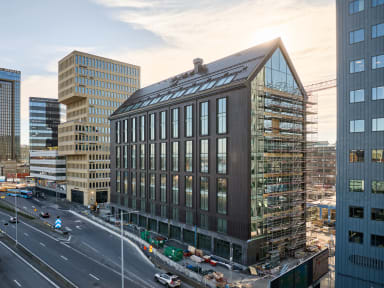Materials and circularity
NCC strives to close the loop and prioritizes the use of circular material and product selection, minimizing and responsibly managing the waste that is created in the construction process, and building to enable recycling and reuse. Circular materials shall be a feature of all projects. ‘Materials and circularity’ is one of the focus areas in NCC’s sustainability framework.
Design and materials selection
Work on issues involving materials, circularity and waste is performed on the basis of each business area’s specific conditions and operations and is designed to reduce the use of materials with a negative impact on the climate, environment, and human health. Efficient resource utilization, purchases of materials with the lowest possible environmental impact and increased recycling are essential in this work. The materials that have the greatest climate impact are concrete, steel and asphalt, although circular material flows are also of great importance in the use of other materials, such as rock and soil material. NCC applies the precautionary principle to the selection of materials, and several development projects are under way.
Recycling and reuse
The construction waste generated at construction sites represents great potential because it can be used in other projects. NCC engages in internal cooperation between various functions and business areas, and with suppliers, to develop new ways of reducing construction waste and reintroducing it into production and reusing and recycling materials. Cooperation concerning circularity also occurs between property development and contracting operations, based on the projects’ specific conditions.
Traceability throughout the value chain
NCC’s aims to only use materials and products that are sound from an environmental and health perspective. Ultimately, the aim is to be able to recycle all input materials in buildings when the service life of the building expires. A crucial link in the transition to the use of more recyclable products and materials is to impose requirements on suppliers and to work with traceability throughout the value chain. NCC’s digitization work supports the Group’s sustainability ambitions. Digital models and tools are a prerequisite for this work, for example, to minimize production waste, make the right selection of materials while considering their lifecycle impact, manage chemical contents and increase recycling of building materials in connection with renovation and demolition.
Circular handling of excavation mass
In infrastructure projects, NCC’s aims to only excavate no more soil and rock than is strictly necessary, and the company also strives to increase the reuse of excavation masses that were previously sent to landfill. Reuse occurs either within the specific project or in a closely located project that needs filler materials, and where the excavated mass has the required technical and environmental qualities for. Actions include systematic sampling and chemical analysis of the rock in order to find suitable projects for receiving the material.
Preventing and reducing waste
The construction sector generates large amounts of waste. NCC collaborates with various players in the value chain to adopt to a circular construction process and minimize the negative impact on people and the environment such as the waste that construction gives rise to. This includes using more recovered materials, ensuring the use of non-hazardous materials, standardized construction with made-to-measure and prefabricated products to reduce waste, and designing the buildings so that it is possible to reuse and recycle.

